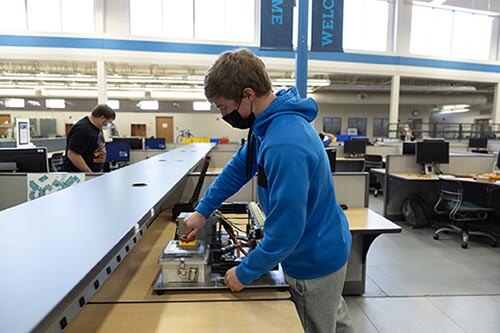Program Costs & Financial Aid
See costs of tuition, books, and supplies.This program is fully eligible for financial aid.
Estimates based on in-state residency. Learn more about tuition and fees.
Explore Locations
Follow Your Path
All credits from the following certificate(s) apply toward this associate degree:
Industrial Maintenance, 904621
Ask your advisor about 2+2 transfer opportunities.
Delivery
Complete lab activities for this program at the Engineering Technology Center – whenever it’s convenient for you. The lab is open days, evenings, and Saturdays. View center hours and take a virtual tour!
How do I get started in this program?
Requirements for Program Entry
- Apply at www.nwtc.edu/apply.
- Submit the following to transcripts@nwtc.edu: • High school transcript (or GED/HSED transcript). • College transcript.
- Tip! Our admission advisors will assist you through every step. Have questions? Connect with NWTC Admissions at start@nwtc.edu or 920-498-5444.
- Beginning courses require mastery of algebra skills (real numbers, algebraic expressions, equations and inequalities, word problems, measurements).
What are my courses?
Curriculum
Students following the study plan below will complete the Electro Mechanical Technology associate degree in the number of semesters shown.
First Semester
8 Week 1
8 Week 2
Second Semester
8 Week 1
8 Week 2
Full Semester
Third Semester
8 Week 1
8 Week 2
Fourth Semester
8 Week 1
8 Week 2
Full Semester
Social Science Course Options (the Recommended Program Course is Identified with an *):
- Curriculum Note: The credit for 10-890-101, College 101 is an Institutional Requirement for graduation. Consequently, it is not part of the program requirements, but must be passed with a "C' or better.
- Students must pass 10-801-136, English Composition 1 with a "C" or better to take 10-801-197, Technical Reporting.
- If a student is considering pursuing a 4-year degree, Intermediate Algebra w/Apps, 10-804-118, should be taken in place of 10-804-113, College Tech Math 1A and 10-804-196, Trigonometry w/Apps should be taken in place of 10-804-114, College Tech Math 1B.
Program Outcomes
- Understand and apply knowledge of electricity, electronics, hydraulics, and electric motors and mechanics.
- Read technical drawings, schematics, and diagrams.
- Document technical information through descriptive writing, sketches/diagrams, mathematical expression, computation, and graphs.
- Perform electrical, mechanical, and fluid measurements by properly selecting tools and test equipment.
- Perform electrical/mechanical assembly/disassembly, repair, or calibrate components by properly selecting tools and equipment and following procedures.
- Understand the overall operation and control of machines.
- Understand the basic fastening skills related to machine fabrication and assembly requirements.
- Apply electrical skills to troubleshoot control and operator panels.
- Apply programming languages to the control of single programmable controllers and industrial networks.
- Apply critical thinking skills to solving problems.
- Effectively communicate and perform in a team environment.
- Perform safe work practices.
What careers are in my future?
Graduate Employment
with 25% in field
Employment Potential
A graduate of this program will have the potential for employment in the following areas:
- Automated Equipment Technician: maintains and repairs electronically-controlled automatic production equipment including servo hydraulics equipment, programmable controllers, motor controllers, and robotic equipment.
- Electro-Mechanical Technician: maintains and repairs electro-mechanical equipment including drive systems, position sensors, cabling, and automatic production equipment; works with mechanical and/or electrical engineers to install and evaluate electro-mechanical systems; and builds mock-ups of production equipment.
- Electronics Technician: maintains and repairs electronic equipment including cables, communication equipment, computers, security systems, and CNC equipment; works with electronics engineers in building breadboard and prototype devices; and evaluates and tests electronic devices and systems.
- Field Service Technician: services, repairs, and overhauls equipment in the customer’s facility; works with sales personnel; and demonstrates new equipment to potential customers.
- Fluid Power Technician: maintains and repairs industrial hydraulic/pneumatic production equipment, hydraulic/pneumatic control systems, hydraulic/pneumatic robots, and servo and proportional hydraulic systems.
- Installation Technician: installs and sets up automated production equipment, robotic systems, and production control systems.
Employment opportunities with additional education
- Electro-Mechanical Service Supervisor
- Electro-Mechanical Shop Supervisor
- Electro-Mechanical Systems Test Engineer
- Field Service Supervisor
- Maintenance Group Manager
- Service Control Technician
What's next after graduation?
Start here. Finish at a four-year.
What else do I need to know about the program?
Study Abroad Opportunities
The International Programs staff continually seeks opportunities for students to travel abroad for educational experiences that may be offered in association with program courses.

